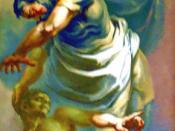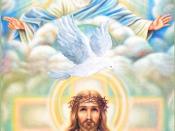Jesus said unto him, Thomas, because thou hast seen me, thou hast believed: blessed are they that have not seen, and yet have believed.
-John 20:29
Faith has no better definition than the one described by the Gospel of John in the above quotation. Jesus clearly exemplifies the blessedness in true faith as he states that those who have not seen and yet believe are blessed. Such a quotation is paramount to the understanding of faith. Often times, people are mistaken in deeming faith and belief as one and the same thing, however Jesus' definition would lead one to a different conclusion, that faith is separate from simple belief, and is seemingly much more important. Not only does faith require blind belief, but requires an element of trust, which people are usually hesitant to bestow. This hesitation in giving out blind belief, is the result of certain detractors of faith, namingly disbelief, heresy, apostasy and blasphemy.
These four elements, when present in a person's life, take away from their ability to have faith, especially faith in God. Disbelief is simply the rejection of faith by a person who clearly has realized the obligation to God's word. Heresy is the deliberate and obstinate denial of God's truth by a person who is baptized, and once accepted the faith. Apostasy involves the rejecting of the entire Christian belief again by a person who was once baptized. Heresy and Apostasy differ in that heresy denies only some beliefs whereas apostasy denies the validity of the whole Christian teaching. As one can imagine, heresy often leads to apostasy. Lastly, blasphemy detracts from faith, as it is the contemptuous speaking about God. By avoiding these four attacks on faith, one can maintain strength in belief, which results in the maintenance of the other two theological...


